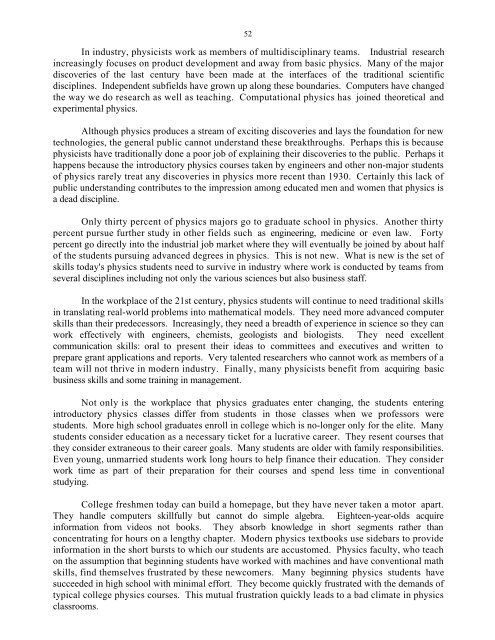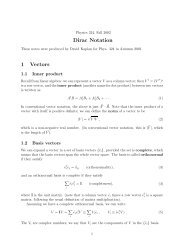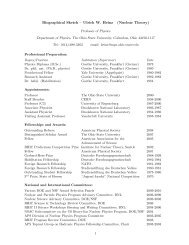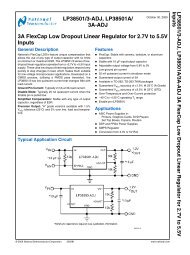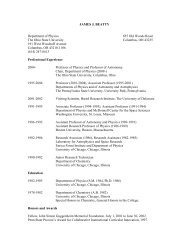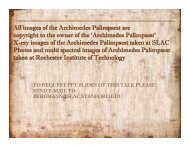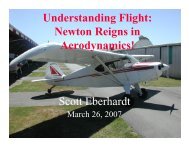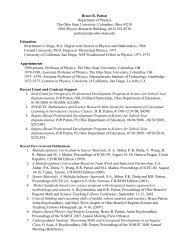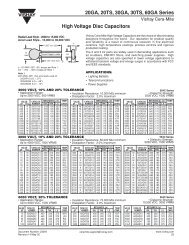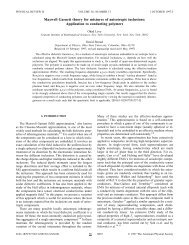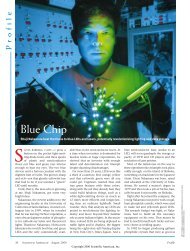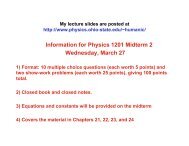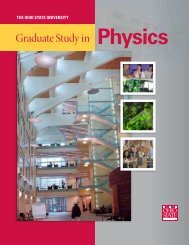Brasil Final Report - Department of Physics - The Ohio State University
Brasil Final Report - Department of Physics - The Ohio State University
Brasil Final Report - Department of Physics - The Ohio State University
Create successful ePaper yourself
Turn your PDF publications into a flip-book with our unique Google optimized e-Paper software.
52<br />
In industry, physicists work as members <strong>of</strong> multidisciplinary teams. Industrial research<br />
increasingly focuses on product development and away from basic physics. Many <strong>of</strong> the major<br />
discoveries <strong>of</strong> the last century have been made at the interfaces <strong>of</strong> the traditional scientific<br />
disciplines. Independent subfields have grown up along these boundaries. Computers have changed<br />
the way we do research as well as teaching. Computational physics has joined theoretical and<br />
experimental physics.<br />
Although physics produces a stream <strong>of</strong> exciting discoveries and lays the foundation for new<br />
technologies, the general public cannot understand these breakthroughs. Perhaps this is because<br />
physicists have traditionally done a poor job <strong>of</strong> explaining their discoveries to the public. Perhaps it<br />
happens because the introductory physics courses taken by engineers and other non-major students<br />
<strong>of</strong> physics rarely treat any discoveries in physics more recent than 1930. Certainly this lack <strong>of</strong><br />
public understanding contributes to the impression among educated men and women that physics is<br />
a dead discipline.<br />
Only thirty percent <strong>of</strong> physics majors go to graduate school in physics. Another thirty<br />
percent pursue further study in other fields such as engineering, medicine or even law. Forty<br />
percent go directly into the industrial job market where they will eventually be joined by about half<br />
<strong>of</strong> the students pursuing advanced degrees in physics. This is not new. What is new is the set <strong>of</strong><br />
skills today's physics students need to survive in industry where work is conducted by teams from<br />
several disciplines including not only the various sciences but also business staff.<br />
In the workplace <strong>of</strong> the 21st century, physics students will continue to need traditional skills<br />
in translating real-world problems into mathematical models. <strong>The</strong>y need more advanced computer<br />
skills than their predecessors. Increasingly, they need a breadth <strong>of</strong> experience in science so they can<br />
work effectively with engineers, chemists, geologists and biologists. <strong>The</strong>y need excellent<br />
communication skills: oral to present their ideas to committees and executives and written to<br />
prepare grant applications and reports. Very talented researchers who cannot work as members <strong>of</strong> a<br />
team will not thrive in modern industry. <strong>Final</strong>ly, many physicists benefit from acquiring basic<br />
business skills and some training in management.<br />
Not only is the workplace that physics graduates enter changing, the students entering<br />
introductory physics classes differ from students in those classes when we pr<strong>of</strong>essors were<br />
students. More high school graduates enroll in college which is no-longer only for the elite. Many<br />
students consider education as a necessary ticket for a lucrative career. <strong>The</strong>y resent courses that<br />
they consider extraneous to their career goals. Many students are older with family responsibilities.<br />
Even young, unmarried students work long hours to help finance their education. <strong>The</strong>y consider<br />
work time as part <strong>of</strong> their preparation for their courses and spend less time in conventional<br />
studying.<br />
College freshmen today can build a homepage, but they have never taken a motor apart.<br />
<strong>The</strong>y handle computers skillfully but cannot do simple algebra. Eighteen-year-olds acquire<br />
information from videos not books. <strong>The</strong>y absorb knowledge in short segments rather than<br />
concentrating for hours on a lengthy chapter. Modern physics textbooks use sidebars to provide<br />
information in the short bursts to which our students are accustomed. <strong>Physics</strong> faculty, who teach<br />
on the assumption that beginning students have worked with machines and have conventional math<br />
skills, find themselves frustrated by these newcomers. Many beginning physics students have<br />
succeeded in high school with minimal effort. <strong>The</strong>y become quickly frustrated with the demands <strong>of</strong><br />
typical college physics courses. This mutual frustration quickly leads to a bad climate in physics<br />
classrooms.


